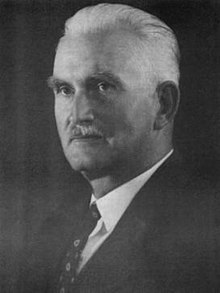Richard Alfred Rossiter
| Richard Alfred Rossiter | |
|---|---|
 |
|
| Born |
December 19, 1886 Oswego, New York, U.S. |
| Died | January 26, 1977 (aged 90) Bloemfontein, South Africa |
| Residence | United States |
| Nationality | American |
| Alma mater |
Wesleyan University University of Michigan |
| Known for | Rossiter–McLaughlin effect |
| Scientific career | |
| Fields | Astronomy |
| Institutions | Lamont–Hussey Observatory |
| Influenced | Dean B. McLaughlin |
Richard Alfred Rossiter (December 19, 1886 – January 26, 1977) was an American astronomer, known for the Rossiter–McLaughlin effect. Rossiter served as director of the Lamont-Hussey Observatory from 1928 until 1952.
Rossiter was born in Oswego, New York, on December 19, 1886. He graduated from Wesleyan University in 1914, and the next year married Jane van Dusen in 1915. He taught mathematics at Wesleyan Seminary for five years before enrolling in the astronomy program at the University of Michigan. He earned a master's degree in 1920, and three years later earned a doctorate.
In his doctoral dissertation, Rossiter established stellar rotation as the cause of the observed spectral shift in spectrograms of stars, specifically, Beta Lyrae.
Rossiter and his wife had two children Laura and Alfred.
Rossiter became the first director of the Lamont–Hussey Observatory in 1928. During this tenure at the observator, he made more than 5,000 discoveries of double stars. In 1955, he published a Catalogue of Southern Double Stars, dedicated to W. J. Hussey, one of the professors for whom the observatory was named.
Rossiter retired in Natal, South Africa in 1953, never returning to the U.S. He died at the age of 90 in Bloemfontein.
...
Wikipedia
